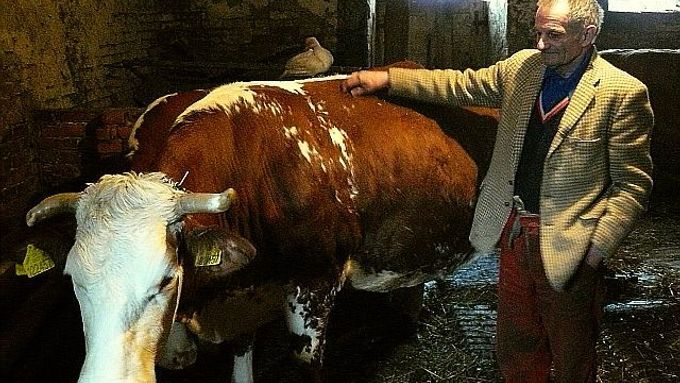Mělčany-Dobruška - Zdeněk Žďárek from Mělčany near Dobruška was fifteen when he saw the communist regime confiscate his grandfather's field next to a farm he was born on and working hard on since he was a little child.
In 1990, immediately after the Velvet Revolution, he returned to the family tradition and started to farm the land again. "The farm has a hundred years of tradition!" he says. Nevertheless, he is now himself threatened with expropriation of his property.
Part of the five hectares of the land he cultivates got in the way of a proposed anti-flood dam. Mr Žďárek is not willing to sacrifice his fields for it.
The so-called anti-flood amendment of the Water Act that would give the state power to expropriate land needed for polders close to the planned dams is now in its second reading at the Parliament.
Give me fertile fields and a farm
The seventy-year-old farmer with a strong bond to his property is a typical case of a person threatened with expropriation.
Mr Žďárek has been trying to negotiate with the Labe river management authority, Povodí Labe, a property swap for his land for seven years, but has not reached an agreement yet.
Flood Amendment to Water Act:
- Defines the polder territory of the managed flooding spill
- Authorizes expropriation of land property under the polder dams to build both the dams and communications (10-20% of polder area)
- People farming the "bottom" of the polder will be entitled to compensation for crops and growth after a managed flooding spill, including compensation for subsidies returned to European Funds (80-90% of polder area)
"First, they said they would like to build a dam here. Then their plans changed and became broader. Finally they said the dam will eventually mean all the land I am cultivating will end up under water," Mr. Žďárek told us.
"If I handed over the fields to them, they would build a dam seventeen meter high just a couple of meters from my house. I cannot imagine living next to it. I don't know what would happen if the dam were to break," Mr Žďárek fears.
He's demanding full compensation for his fertile fields and a new farm from the River Authority. "They offered me some land close to the village of Meřič. But the soil is too hard there," he says. So he declined the offer.
The environment officials from the city hall in Dobruška came to see him, too, offering fields close to the Bačetín cow barn. "That's in the mountains, a rocky terrain. It's not right to offer such a poor replacement for my fields," Mr Žďárek laments.
READ MORE: Ministry suggests confiscation of flood risk areas
We understand, but what can we do?
Mr Václav Jirásek, the spokesman of the River Authority Povodí Labe, knows Zdeněk Žďárek very well from years of negotiations.
"He's seventy. He has spent all his life on this piece of land. He's proud to be able to sustain private land ownership," Jirásek notes.
"I have plenty of understanding for him, in principle. Unfortunately, I have to admit that he could easily become a classic case where we might apply expropriation by force," adds Mr Jirásek.
The river authority claims the farmer from Mělčany is determined to reject any offer, however attractive.
Whereas a holding space for stopping flood water, be it dry polder or water reservoir, could save the surrounding environment from greater damages, they say.
The most devastating floods so far, in 1998, claimed six lives, thirty destroyed villages and damages worth two billion crowns(£6,000,000/$124,000,000). Dobruška and neighbouring villages were among the most gravely affected.
That revived plans to build anti-flood dams similar to those first proposed during the pre-war period.
READ MORE: Czech state faces lawsuits for unpaid property
The water reservoir was rejected
Povodí Labe River Agency stresses that a water reservoir would not only be useful during the floods but also in periods of extreme droughts. But the big dam project is being opposed by environmental groups.
One project for a reservoir was rejected by the district authority, and at the present it is considering the idea for a dry polder.
Mr Žďárek doesn't like the long haggling between the River Authority and the environmental groups either.
"It's not clear whether and when the works are to begin. I don't know what the situation is. My farm is more and more dilapidated every year; it needs plenty of work, especially my roof needs repairing. I don't know whether to invest in it or not," he says.
Meanwhile, he keeps to business as usual. "I am producing wheat and potatoes. For myself and for the cattle. I have a small herd of cows, some geese and hens. I did not stop farming, and I am not going to quit so soon," he assured us.
He's not afraid of expropriation. He doesn't want to accept the up and coming offer although it might mean losing money in the next years.
"I know many people are against passing this law, including politicians. I believe no politician would risk voting for a law that would severely jeopardize private property," Mr Ždárek says.








